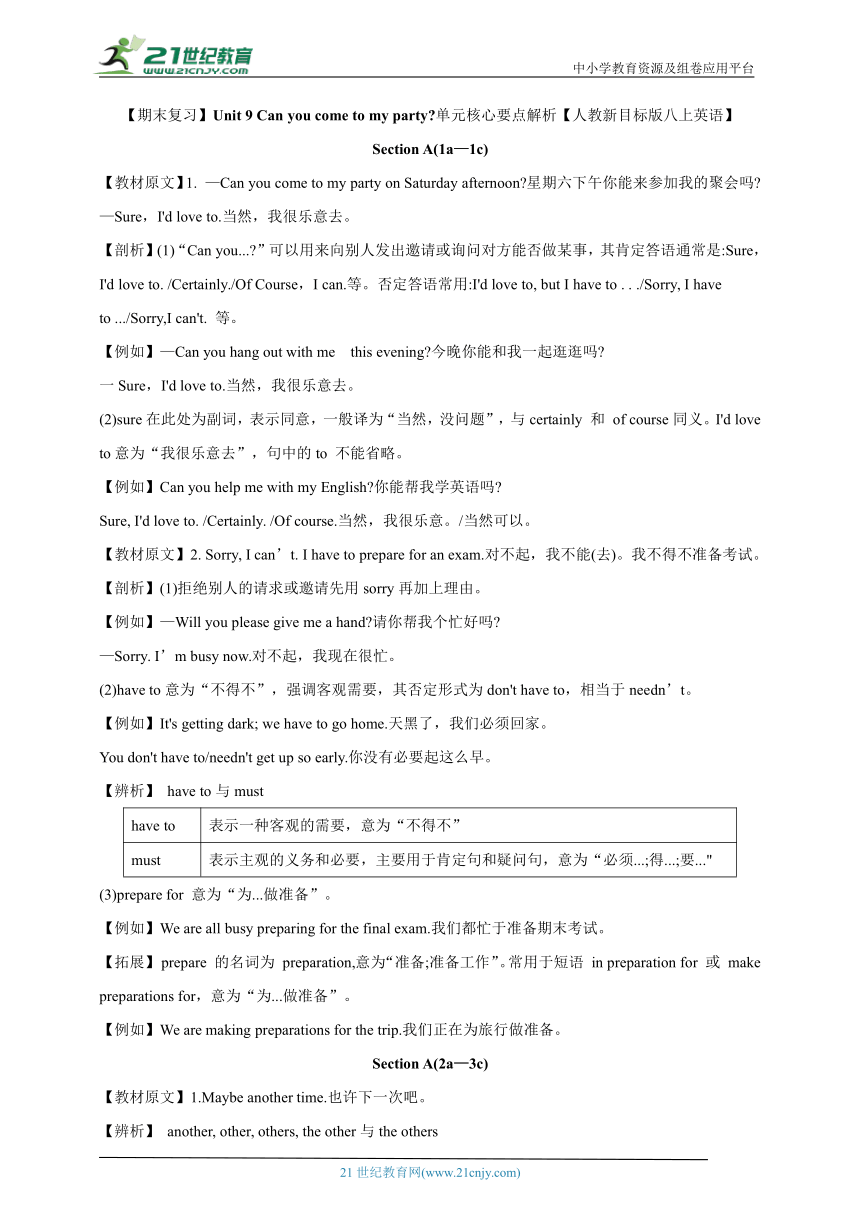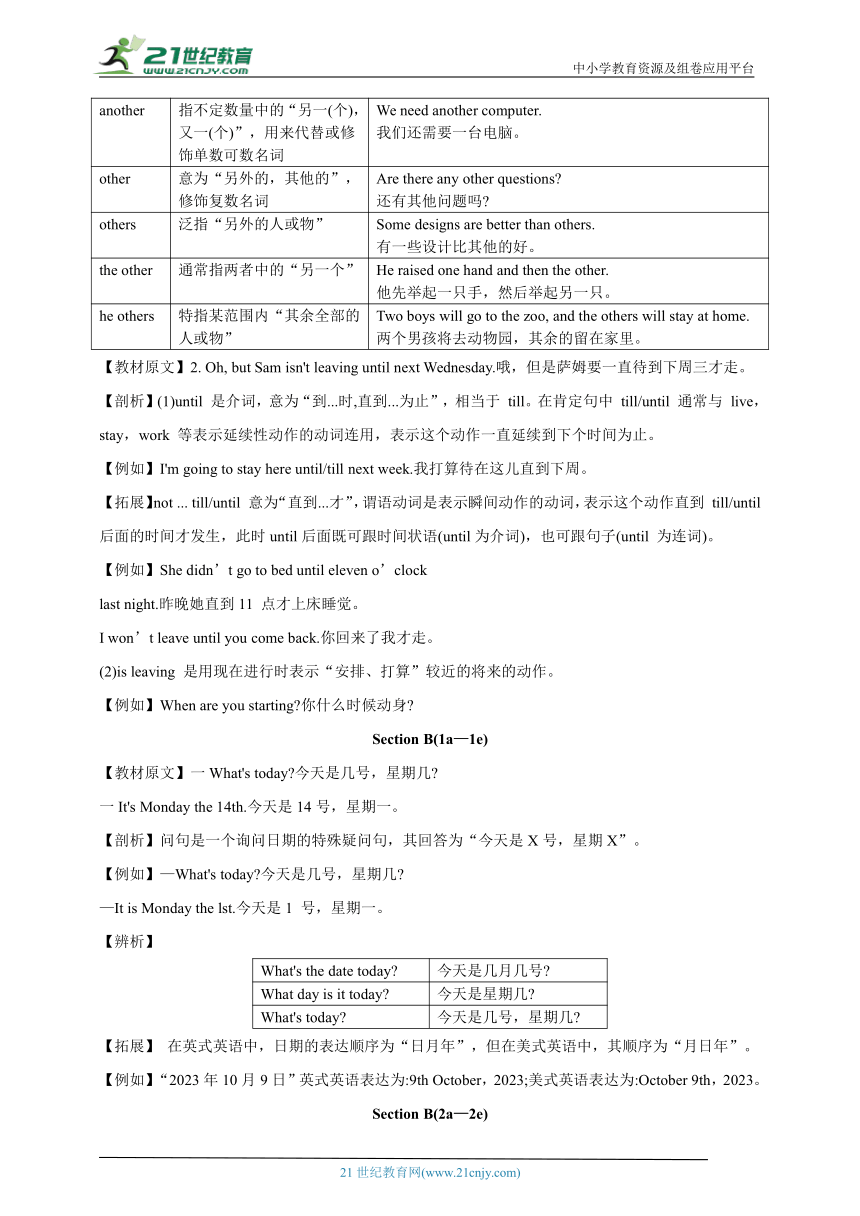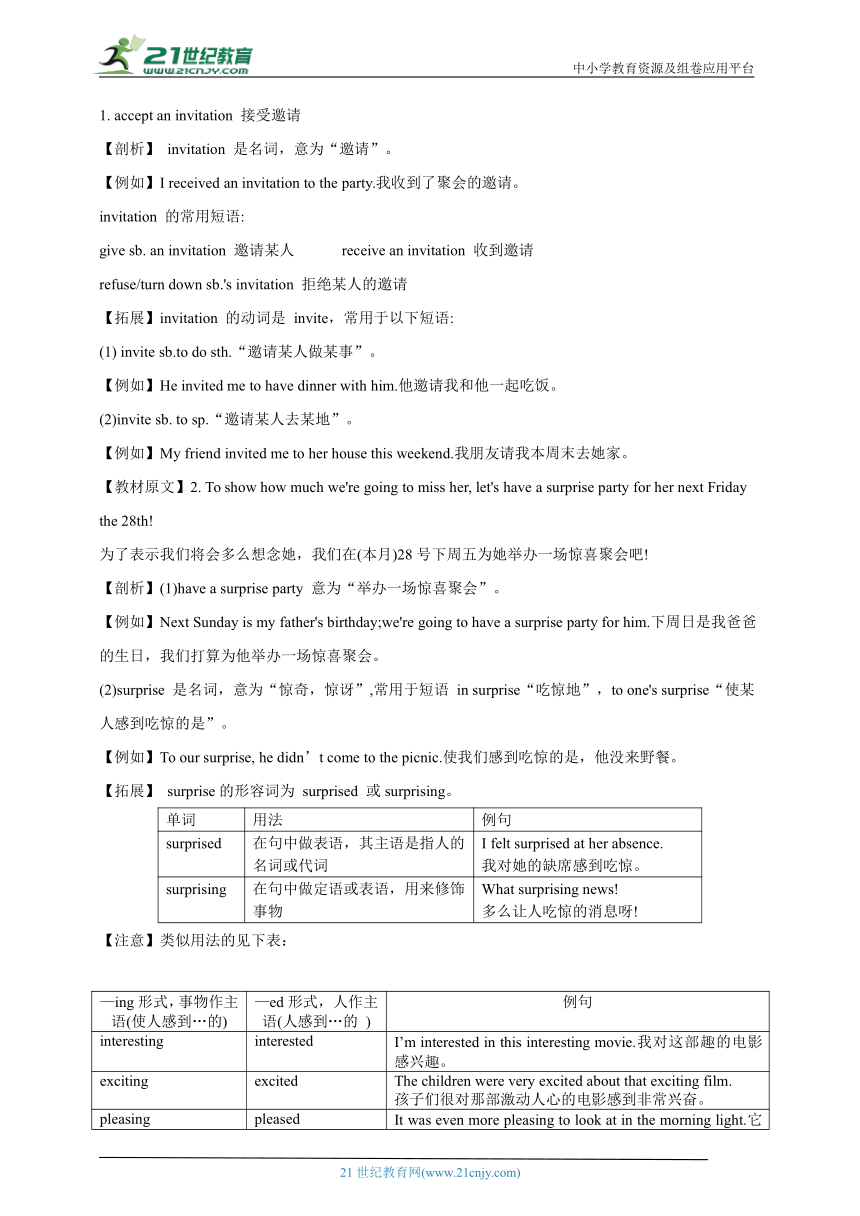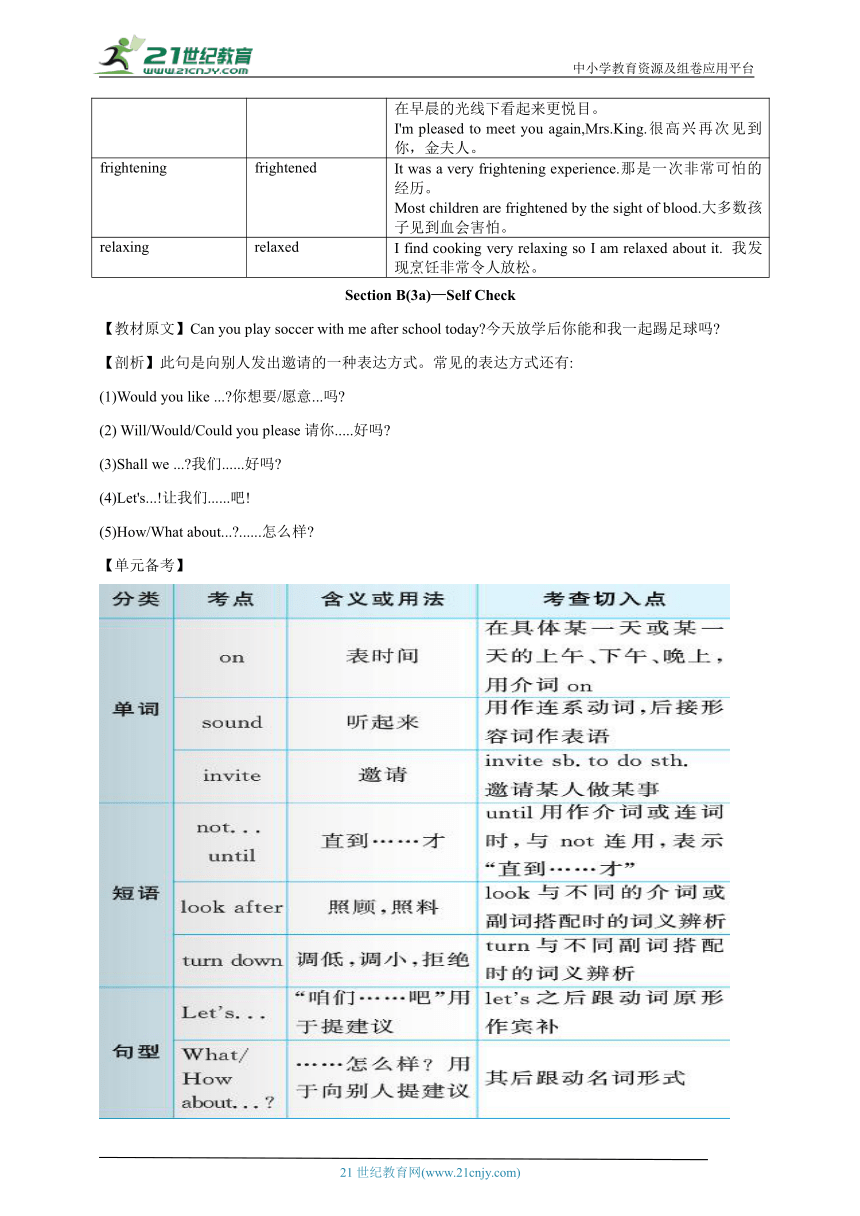【期末复习】Unit 9 Can you come to my party?单元核心要点解析(学案)【人教新目标版八上英语】
文档属性
| 名称 | 【期末复习】Unit 9 Can you come to my party?单元核心要点解析(学案)【人教新目标版八上英语】 |

|
|
| 格式 | docx | ||
| 文件大小 | 367.5KB | ||
| 资源类型 | 试卷 | ||
| 版本资源 | 人教新目标(Go for it)版 | ||
| 科目 | 英语 | ||
| 更新时间 | 2024-12-19 00:00:00 | ||
图片预览




文档简介
中小学教育资源及组卷应用平台
【期末复习】Unit 9 Can you come to my party 单元核心要点解析【人教新目标版八上英语】
Section A(1a—1c)
【教材原文】1. —Can you come to my party on Saturday afternoon 星期六下午你能来参加我的聚会吗
—Sure,I'd love to.当然,我很乐意去。
【剖析】(1)“Can you... ”可以用来向别人发出邀请或询问对方能否做某事,其肯定答语通常是:Sure,I'd love to. /Certainly./Of Course,I can.等。否定答语常用:I'd love to, but I have to . . ./Sorry, I have to .../Sorry,I can't. 等。
【例如】—Can you hang out with me this evening 今晚你能和我一起逛逛吗
一Sure,I'd love to.当然,我很乐意去。
(2)sure在此处为副词,表示同意,一般译为“当然,没问题”,与certainly 和 of course同义。I'd love to意为“我很乐意去”,句中的to 不能省略。
【例如】Can you help me with my English 你能帮我学英语吗
Sure, I'd love to. /Certainly. /Of course.当然,我很乐意。/当然可以。
【教材原文】2. Sorry, I can’t. I have to prepare for an exam.对不起,我不能(去)。我不得不准备考试。
【剖析】(1)拒绝别人的请求或邀请先用sorry再加上理由。
【例如】—Will you please give me a hand 请你帮我个忙好吗
—Sorry. I’m busy now.对不起,我现在很忙。
(2)have to意为“不得不”,强调客观需要,其否定形式为don't have to,相当于needn’t。
【例如】It's getting dark; we have to go home.天黑了,我们必须回家。
You don't have to/needn't get up so early.你没有必要起这么早。
【辨析】 have to与must
have to 表示一种客观的需要,意为“不得不”
must 表示主观的义务和必要,主要用于肯定句和疑问句,意为“必须...;得...;要..."
(3)prepare for 意为“为...做准备”。
【例如】We are all busy preparing for the final exam.我们都忙于准备期末考试。
【拓展】 prepare 的名词为 preparation,意为“准备;准备工作”。常用于短语 in preparation for 或 make preparations for,意为“为...做准备”。
【例如】We are making preparations for the trip.我们正在为旅行做准备。
Section A(2a—3c)
【教材原文】1.Maybe another time.也许下一次吧。
【辨析】 another, other, others, the other与the others
another 指不定数量中的“另一(个),又一(个)”,用来代替或修饰单数可数名词 We need another computer. 我们还需要一台电脑。
other 意为“另外的,其他的”,修饰复数名词 Are there any other questions 还有其他问题吗
others 泛指“另外的人或物” Some designs are better than others. 有一些设计比其他的好。
the other 通常指两者中的“另一个” He raised one hand and then the other. 他先举起一只手,然后举起另一只。
he others 特指某范围内“其余全部的人或物” Two boys will go to the zoo, and the others will stay at home. 两个男孩将去动物园,其余的留在家里。
【教材原文】2. Oh, but Sam isn't leaving until next Wednesday.哦,但是萨姆要一直待到下周三才走。
【剖析】(1)until 是介词,意为“到...时,直到...为止”,相当于 till。在肯定句中 till/until 通常与 live,stay,work 等表示延续性动作的动词连用,表示这个动作一直延续到下个时间为止。
【例如】I'm going to stay here until/till next week.我打算待在这儿直到下周。
【拓展】not ... till/until 意为“直到...才”,谓语动词是表示瞬间动作的动词,表示这个动作直到 till/until 后面的时间才发生,此时until后面既可跟时间状语(until为介词),也可跟句子(until 为连词)。
【例如】She didn’t go to bed until eleven o’clock
last night.昨晚她直到11 点才上床睡觉。
I won’t leave until you come back.你回来了我才走。
(2)is leaving 是用现在进行时表示“安排、打算”较近的将来的动作。
【例如】When are you starting 你什么时候动身
Section B(1a—1e)
【教材原文】一What's today 今天是几号,星期几
一It's Monday the 14th.今天是14号,星期一。
【剖析】问句是一个询问日期的特殊疑问句,其回答为“今天是X号,星期X”。
【例如】—What's today 今天是几号,星期几
—It is Monday the lst.今天是1 号,星期一。
【辨析】
What's the date today 今天是几月几号
What day is it today 今天是星期几
What's today 今天是几号,星期几
【拓展】 在英式英语中,日期的表达顺序为“日月年”,但在美式英语中,其顺序为“月日年”。
【例如】“2023年10月9日”英式英语表达为:9th October,2023;美式英语表达为:October 9th,2023。
Section B(2a—2e)
1. accept an invitation 接受邀请
【剖析】 invitation 是名词,意为“邀请”。
【例如】I received an invitation to the party.我收到了聚会的邀请。
invitation 的常用短语:
give sb. an invitation 邀请某人 receive an invitation 收到邀请
refuse/turn down sb.'s invitation 拒绝某人的邀请
【拓展】invitation 的动词是 invite,常用于以下短语:
(1) invite sb.to do sth.“邀请某人做某事”。
【例如】He invited me to have dinner with him.他邀请我和他一起吃饭。
(2)invite sb. to sp.“邀请某人去某地”。
【例如】My friend invited me to her house this weekend.我朋友请我本周末去她家。
【教材原文】2. To show how much we're going to miss her, let's have a surprise party for her next Friday the 28th!
为了表示我们将会多么想念她,我们在(本月)28号下周五为她举办一场惊喜聚会吧!
【剖析】(1)have a surprise party 意为“举办一场惊喜聚会”。
【例如】Next Sunday is my father's birthday;we're going to have a surprise party for him.下周日是我爸爸的生日,我们打算为他举办一场惊喜聚会。
(2)surprise 是名词,意为“惊奇,惊讶”,常用于短语 in surprise“吃惊地”,to one's surprise“使某人感到吃惊的是”。
【例如】To our surprise, he didn’t come to the picnic.使我们感到吃惊的是,他没来野餐。
【拓展】 surprise的形容词为 surprised 或surprising。
单词 用法 例句
surprised 在句中做表语,其主语是指人的名词或代词 I felt surprised at her absence. 我对她的缺席感到吃惊。
surprising 在句中做定语或表语,用来修饰事物 What surprising news! 多么让人吃惊的消息呀!
【注意】类似用法的见下表:
—ing形式,事物作主语(使人感到…的) —ed形式,人作主语(人感到…的 ) 例句
interesting interested I’m interested in this interesting movie.我对这部趣的电影感兴趣。
exciting excited The children were very excited about that exciting film. 孩子们很对那部激动人心的电影感到非常兴奋。
pleasing pleased It was even more pleasing to look at in the morning light.它在早晨的光线下看起来更悦目。 I'm pleased to meet you again,Mrs.King.很高兴再次见到你,金夫人。
frightening frightened It was a very frightening experience.那是一次非常可怕的经历。 Most children are frightened by the sight of blood.大多数孩子见到血会害怕。
relaxing relaxed I find cooking very relaxing so I am relaxed about it. 我发现烹饪非常令人放松。
Section B(3a)—Self Check
【教材原文】Can you play soccer with me after school today 今天放学后你能和我一起踢足球吗
【剖析】此句是向别人发出邀请的一种表达方式。常见的表达方式还有:
(1)Would you like ... 你想要/愿意...吗
(2) Will/Would/Could you please请你.....好吗
(3)Shall we ... 我们......好吗
(4)Let's...!让我们......吧!
(5)How/What about... ......怎么样
【单元备考】
【单元语法】发出、接受邀请与拒绝邀请
本单元主要学习用can发出邀请、接受邀请和拒绝邀请。发出邀请:
Can you/he/she/they come/go to... 能来/去...吗
【接受邀请】
(1)Sure/Certainly.I'd like/love to,当然,我愿意去。
(2)All right.好的,行吧。
(3)Good idea!真是好主意!
(4)Yes.I'd like/love to.是的,我愿意去,
【拒绝邀请】
不仅给出明确的拒绝,同时要给出拒绝的理由。
(1)Sorry./I'm sorry.1 have to/must do sth.对不起,我必须做某事。
(2)No,he/she can't. He/She has to/must do sth.
No,he/she is afraid not. He/She has to/must do sth.不,他/她(恐怕)不能。他/她必须做某事。
(3)No, I'm/he is/she is/they are not free. I have to/He has to/She has to/They have to/must do sth,不,我/他/她/他们没有空。我/他/她/他们必须做某事。
(4) I'd/He'd/She'd/They'd love to, but I have to/he has to/she has to/they have to/must do sth,我/他/她/他们想去,但是我/他/她/他们必须做某事。
Can you play tennis with me this afternoon 今天下午你能和我一起打网球吗
Sure,I'd love to.当然,我愿意。/No,I'm not free.I have to meet my friends,不行,我没空。我得约见朋友。
【拓展】英语中除用can外,还有多种表达方式来提出我们的建议或发出邀请。不同的表达方式会带来不同的效果,你知道该用哪种方式吗
(1)may可用来表示提出建议或征求对方的意见。在回答 may引导的疑问句时,肯定回答用Yes,please.否定回答用 No, you mustn't./No, you can't./No, you'd better not.
—May I take this book home to read 我可以把这本书拿回家看吗
一No,you can't.不可以。
(2)可以用“Let's...”来提出建议或征求对方意见。
Let's make it a little earlier,OK 我们早一点儿吧,好吗
Let's go and find something interesting to do.让我们去找点有趣的事做吧。
(3)可以用 What about/How about... 来提出建议,about 是介词,后面要接名词或动词的—ing形式。
What about/How about a drink 喝一杯怎么样
What/How about tomorrow 明天怎么样
What about writing back to him about it 要不就这事给他回一封信
(4)可以用“Why not... ”来提出建议,表示“为何不.... ”not 后面接动词原形。Why not... 实际上是“Why don't we/you... ”的简略形式。
Why not meet at the school gate at eight 为何不八点的时候在校门口见面
Why don't we stay here another day 我们为什么不在这儿再待一天呢
(5)had better意为“最好...”,后面跟动词原形,其否定形式是在 had better后加 not,而不要再加助动词。
You'd better stay at home today.今天你最好待在家里。
You'd better not go out at night.晚上你最好别出去。
You'd better buy a better one. 你最好买个好点的。
(6)用“Would/Could you please... ”表示。此句式中的 Would/Could you please... 表示建议或请求时,would/could并非是动词的过去式,而是表示说话者语气比较委婉。
Could you please go hiking with me 和我一起去远足,好吗
(7)可以用“Will you... ”表示。Will you... 常表示委婉地建议或请求。
Will you go to Wuhan with us 和我们一起去武汉好吗
Will you tell me where is the nearest bookshop 你能告诉我离这儿最近的书店在哪里吗
(8)shall用于第一、三人称疑问句,表示征求对方的意见。
Shall we go swimming this afternoon 今天下午我们去游泳好吗
Shall I open the window and close the door 我把窗户打开,把门关上好吗
(9)“Don't+动词原形...属于命令式的祈使句,表示较强烈的请求,含有禁止的意味。
Don't be late next time,please.下次请不要再迟到了。
Please don't call me Tom. I'm Tim.请不要叫我汤姆,我叫蒂姆。
(10)可以用Would you like... 来提出建议.意思是“你想要...吗 ”would you like后可接名词或不定式。
Would you like a cup of tea 你想要杯茶吗
Would you like to go and see her 你想要去见她吗
如果我们想说“去散散步好吗 ”英语中可以用下面的几种表达法表示:
Shall we go for a walk
What about/How about going for a walk
Why not go for a walk
Would you like to go for a walk
Let's go for a walk.
如何写邀请信
【写作园地】
邀请信是邀请收信人参加某项活动的书信。邀请信一般包括三个方面:
1.邀请对方参加活动的内容、时间和地点;
2.与该活动有关的事项或原因;
3.期待对方接受邀请,并表示感谢。
语言特点:邀请信叙事一定要清楚、明白。如写给朋友,可用活泼.真诚的言辞;如写给长辈、上级、名人等,语言则应正式,礼貌邀请信中常用到的客套句式如果邀请朋友喝茶或吃饭,则往往用一句话概括“邀请”和“活动内容”两层意思,可以写:
I would like to invite you to dinner at...
Would/Could you like to come to dinner with me at. .
I would be very happy if you could join us for us dinner at...
I hope you could come/join us at...
I look forward to your coming/early reply/meeting you.
如果邀请别人参加晚会、舞会之类的活动,一般先讲一下“活动内容”,然后再发出邀请。
We are having an English evening at.
We should be very pleased if you could join us.
It would be very nice if you would come.
We are holding a dance at...
We would love to have your company.
Will you be able to join us
【抛砖引玉】假如你叫玲玲,最近要举行一个生日派对,想邀请你的好友参加。请根据下表内容写一封邀请信。
要求:1.词数 80 左右。2.语句顺畅。
受邀人 Lucy
活动 生日派对
时间 11月14日晚上7:00—9:00
地点 家
原因 你是我最好的朋友之一,希望你分享我的快乐。
【参考范文】
Dear Lucy,
I'm glad to invite you to attend my birthday party on December 14th at 7:00 p. m. —9:00 p. m. at my home. It's my eighteenth birthday that day, and after that I'll no longer be a child. You're one of my best friends at school. I hope you can share the happiness with me. I'm sure we'll have a great time that night.
I'm looking forward to your coming.
Sincerely yours,
Lingling
21世纪教育网 www.21cnjy.com 精品试卷·第 2 页 (共 2 页)
21世纪教育网(www.21cnjy.com)
【期末复习】Unit 9 Can you come to my party 单元核心要点解析【人教新目标版八上英语】
Section A(1a—1c)
【教材原文】1. —Can you come to my party on Saturday afternoon 星期六下午你能来参加我的聚会吗
—Sure,I'd love to.当然,我很乐意去。
【剖析】(1)“Can you... ”可以用来向别人发出邀请或询问对方能否做某事,其肯定答语通常是:Sure,I'd love to. /Certainly./Of Course,I can.等。否定答语常用:I'd love to, but I have to . . ./Sorry, I have to .../Sorry,I can't. 等。
【例如】—Can you hang out with me this evening 今晚你能和我一起逛逛吗
一Sure,I'd love to.当然,我很乐意去。
(2)sure在此处为副词,表示同意,一般译为“当然,没问题”,与certainly 和 of course同义。I'd love to意为“我很乐意去”,句中的to 不能省略。
【例如】Can you help me with my English 你能帮我学英语吗
Sure, I'd love to. /Certainly. /Of course.当然,我很乐意。/当然可以。
【教材原文】2. Sorry, I can’t. I have to prepare for an exam.对不起,我不能(去)。我不得不准备考试。
【剖析】(1)拒绝别人的请求或邀请先用sorry再加上理由。
【例如】—Will you please give me a hand 请你帮我个忙好吗
—Sorry. I’m busy now.对不起,我现在很忙。
(2)have to意为“不得不”,强调客观需要,其否定形式为don't have to,相当于needn’t。
【例如】It's getting dark; we have to go home.天黑了,我们必须回家。
You don't have to/needn't get up so early.你没有必要起这么早。
【辨析】 have to与must
have to 表示一种客观的需要,意为“不得不”
must 表示主观的义务和必要,主要用于肯定句和疑问句,意为“必须...;得...;要..."
(3)prepare for 意为“为...做准备”。
【例如】We are all busy preparing for the final exam.我们都忙于准备期末考试。
【拓展】 prepare 的名词为 preparation,意为“准备;准备工作”。常用于短语 in preparation for 或 make preparations for,意为“为...做准备”。
【例如】We are making preparations for the trip.我们正在为旅行做准备。
Section A(2a—3c)
【教材原文】1.Maybe another time.也许下一次吧。
【辨析】 another, other, others, the other与the others
another 指不定数量中的“另一(个),又一(个)”,用来代替或修饰单数可数名词 We need another computer. 我们还需要一台电脑。
other 意为“另外的,其他的”,修饰复数名词 Are there any other questions 还有其他问题吗
others 泛指“另外的人或物” Some designs are better than others. 有一些设计比其他的好。
the other 通常指两者中的“另一个” He raised one hand and then the other. 他先举起一只手,然后举起另一只。
he others 特指某范围内“其余全部的人或物” Two boys will go to the zoo, and the others will stay at home. 两个男孩将去动物园,其余的留在家里。
【教材原文】2. Oh, but Sam isn't leaving until next Wednesday.哦,但是萨姆要一直待到下周三才走。
【剖析】(1)until 是介词,意为“到...时,直到...为止”,相当于 till。在肯定句中 till/until 通常与 live,stay,work 等表示延续性动作的动词连用,表示这个动作一直延续到下个时间为止。
【例如】I'm going to stay here until/till next week.我打算待在这儿直到下周。
【拓展】not ... till/until 意为“直到...才”,谓语动词是表示瞬间动作的动词,表示这个动作直到 till/until 后面的时间才发生,此时until后面既可跟时间状语(until为介词),也可跟句子(until 为连词)。
【例如】She didn’t go to bed until eleven o’clock
last night.昨晚她直到11 点才上床睡觉。
I won’t leave until you come back.你回来了我才走。
(2)is leaving 是用现在进行时表示“安排、打算”较近的将来的动作。
【例如】When are you starting 你什么时候动身
Section B(1a—1e)
【教材原文】一What's today 今天是几号,星期几
一It's Monday the 14th.今天是14号,星期一。
【剖析】问句是一个询问日期的特殊疑问句,其回答为“今天是X号,星期X”。
【例如】—What's today 今天是几号,星期几
—It is Monday the lst.今天是1 号,星期一。
【辨析】
What's the date today 今天是几月几号
What day is it today 今天是星期几
What's today 今天是几号,星期几
【拓展】 在英式英语中,日期的表达顺序为“日月年”,但在美式英语中,其顺序为“月日年”。
【例如】“2023年10月9日”英式英语表达为:9th October,2023;美式英语表达为:October 9th,2023。
Section B(2a—2e)
1. accept an invitation 接受邀请
【剖析】 invitation 是名词,意为“邀请”。
【例如】I received an invitation to the party.我收到了聚会的邀请。
invitation 的常用短语:
give sb. an invitation 邀请某人 receive an invitation 收到邀请
refuse/turn down sb.'s invitation 拒绝某人的邀请
【拓展】invitation 的动词是 invite,常用于以下短语:
(1) invite sb.to do sth.“邀请某人做某事”。
【例如】He invited me to have dinner with him.他邀请我和他一起吃饭。
(2)invite sb. to sp.“邀请某人去某地”。
【例如】My friend invited me to her house this weekend.我朋友请我本周末去她家。
【教材原文】2. To show how much we're going to miss her, let's have a surprise party for her next Friday the 28th!
为了表示我们将会多么想念她,我们在(本月)28号下周五为她举办一场惊喜聚会吧!
【剖析】(1)have a surprise party 意为“举办一场惊喜聚会”。
【例如】Next Sunday is my father's birthday;we're going to have a surprise party for him.下周日是我爸爸的生日,我们打算为他举办一场惊喜聚会。
(2)surprise 是名词,意为“惊奇,惊讶”,常用于短语 in surprise“吃惊地”,to one's surprise“使某人感到吃惊的是”。
【例如】To our surprise, he didn’t come to the picnic.使我们感到吃惊的是,他没来野餐。
【拓展】 surprise的形容词为 surprised 或surprising。
单词 用法 例句
surprised 在句中做表语,其主语是指人的名词或代词 I felt surprised at her absence. 我对她的缺席感到吃惊。
surprising 在句中做定语或表语,用来修饰事物 What surprising news! 多么让人吃惊的消息呀!
【注意】类似用法的见下表:
—ing形式,事物作主语(使人感到…的) —ed形式,人作主语(人感到…的 ) 例句
interesting interested I’m interested in this interesting movie.我对这部趣的电影感兴趣。
exciting excited The children were very excited about that exciting film. 孩子们很对那部激动人心的电影感到非常兴奋。
pleasing pleased It was even more pleasing to look at in the morning light.它在早晨的光线下看起来更悦目。 I'm pleased to meet you again,Mrs.King.很高兴再次见到你,金夫人。
frightening frightened It was a very frightening experience.那是一次非常可怕的经历。 Most children are frightened by the sight of blood.大多数孩子见到血会害怕。
relaxing relaxed I find cooking very relaxing so I am relaxed about it. 我发现烹饪非常令人放松。
Section B(3a)—Self Check
【教材原文】Can you play soccer with me after school today 今天放学后你能和我一起踢足球吗
【剖析】此句是向别人发出邀请的一种表达方式。常见的表达方式还有:
(1)Would you like ... 你想要/愿意...吗
(2) Will/Would/Could you please请你.....好吗
(3)Shall we ... 我们......好吗
(4)Let's...!让我们......吧!
(5)How/What about... ......怎么样
【单元备考】
【单元语法】发出、接受邀请与拒绝邀请
本单元主要学习用can发出邀请、接受邀请和拒绝邀请。发出邀请:
Can you/he/she/they come/go to... 能来/去...吗
【接受邀请】
(1)Sure/Certainly.I'd like/love to,当然,我愿意去。
(2)All right.好的,行吧。
(3)Good idea!真是好主意!
(4)Yes.I'd like/love to.是的,我愿意去,
【拒绝邀请】
不仅给出明确的拒绝,同时要给出拒绝的理由。
(1)Sorry./I'm sorry.1 have to/must do sth.对不起,我必须做某事。
(2)No,he/she can't. He/She has to/must do sth.
No,he/she is afraid not. He/She has to/must do sth.不,他/她(恐怕)不能。他/她必须做某事。
(3)No, I'm/he is/she is/they are not free. I have to/He has to/She has to/They have to/must do sth,不,我/他/她/他们没有空。我/他/她/他们必须做某事。
(4) I'd/He'd/She'd/They'd love to, but I have to/he has to/she has to/they have to/must do sth,我/他/她/他们想去,但是我/他/她/他们必须做某事。
Can you play tennis with me this afternoon 今天下午你能和我一起打网球吗
Sure,I'd love to.当然,我愿意。/No,I'm not free.I have to meet my friends,不行,我没空。我得约见朋友。
【拓展】英语中除用can外,还有多种表达方式来提出我们的建议或发出邀请。不同的表达方式会带来不同的效果,你知道该用哪种方式吗
(1)may可用来表示提出建议或征求对方的意见。在回答 may引导的疑问句时,肯定回答用Yes,please.否定回答用 No, you mustn't./No, you can't./No, you'd better not.
—May I take this book home to read 我可以把这本书拿回家看吗
一No,you can't.不可以。
(2)可以用“Let's...”来提出建议或征求对方意见。
Let's make it a little earlier,OK 我们早一点儿吧,好吗
Let's go and find something interesting to do.让我们去找点有趣的事做吧。
(3)可以用 What about/How about... 来提出建议,about 是介词,后面要接名词或动词的—ing形式。
What about/How about a drink 喝一杯怎么样
What/How about tomorrow 明天怎么样
What about writing back to him about it 要不就这事给他回一封信
(4)可以用“Why not... ”来提出建议,表示“为何不.... ”not 后面接动词原形。Why not... 实际上是“Why don't we/you... ”的简略形式。
Why not meet at the school gate at eight 为何不八点的时候在校门口见面
Why don't we stay here another day 我们为什么不在这儿再待一天呢
(5)had better意为“最好...”,后面跟动词原形,其否定形式是在 had better后加 not,而不要再加助动词。
You'd better stay at home today.今天你最好待在家里。
You'd better not go out at night.晚上你最好别出去。
You'd better buy a better one. 你最好买个好点的。
(6)用“Would/Could you please... ”表示。此句式中的 Would/Could you please... 表示建议或请求时,would/could并非是动词的过去式,而是表示说话者语气比较委婉。
Could you please go hiking with me 和我一起去远足,好吗
(7)可以用“Will you... ”表示。Will you... 常表示委婉地建议或请求。
Will you go to Wuhan with us 和我们一起去武汉好吗
Will you tell me where is the nearest bookshop 你能告诉我离这儿最近的书店在哪里吗
(8)shall用于第一、三人称疑问句,表示征求对方的意见。
Shall we go swimming this afternoon 今天下午我们去游泳好吗
Shall I open the window and close the door 我把窗户打开,把门关上好吗
(9)“Don't+动词原形...属于命令式的祈使句,表示较强烈的请求,含有禁止的意味。
Don't be late next time,please.下次请不要再迟到了。
Please don't call me Tom. I'm Tim.请不要叫我汤姆,我叫蒂姆。
(10)可以用Would you like... 来提出建议.意思是“你想要...吗 ”would you like后可接名词或不定式。
Would you like a cup of tea 你想要杯茶吗
Would you like to go and see her 你想要去见她吗
如果我们想说“去散散步好吗 ”英语中可以用下面的几种表达法表示:
Shall we go for a walk
What about/How about going for a walk
Why not go for a walk
Would you like to go for a walk
Let's go for a walk.
如何写邀请信
【写作园地】
邀请信是邀请收信人参加某项活动的书信。邀请信一般包括三个方面:
1.邀请对方参加活动的内容、时间和地点;
2.与该活动有关的事项或原因;
3.期待对方接受邀请,并表示感谢。
语言特点:邀请信叙事一定要清楚、明白。如写给朋友,可用活泼.真诚的言辞;如写给长辈、上级、名人等,语言则应正式,礼貌邀请信中常用到的客套句式如果邀请朋友喝茶或吃饭,则往往用一句话概括“邀请”和“活动内容”两层意思,可以写:
I would like to invite you to dinner at...
Would/Could you like to come to dinner with me at. .
I would be very happy if you could join us for us dinner at...
I hope you could come/join us at...
I look forward to your coming/early reply/meeting you.
如果邀请别人参加晚会、舞会之类的活动,一般先讲一下“活动内容”,然后再发出邀请。
We are having an English evening at.
We should be very pleased if you could join us.
It would be very nice if you would come.
We are holding a dance at...
We would love to have your company.
Will you be able to join us
【抛砖引玉】假如你叫玲玲,最近要举行一个生日派对,想邀请你的好友参加。请根据下表内容写一封邀请信。
要求:1.词数 80 左右。2.语句顺畅。
受邀人 Lucy
活动 生日派对
时间 11月14日晚上7:00—9:00
地点 家
原因 你是我最好的朋友之一,希望你分享我的快乐。
【参考范文】
Dear Lucy,
I'm glad to invite you to attend my birthday party on December 14th at 7:00 p. m. —9:00 p. m. at my home. It's my eighteenth birthday that day, and after that I'll no longer be a child. You're one of my best friends at school. I hope you can share the happiness with me. I'm sure we'll have a great time that night.
I'm looking forward to your coming.
Sincerely yours,
Lingling
21世纪教育网 www.21cnjy.com 精品试卷·第 2 页 (共 2 页)
21世纪教育网(www.21cnjy.com)
同课章节目录
